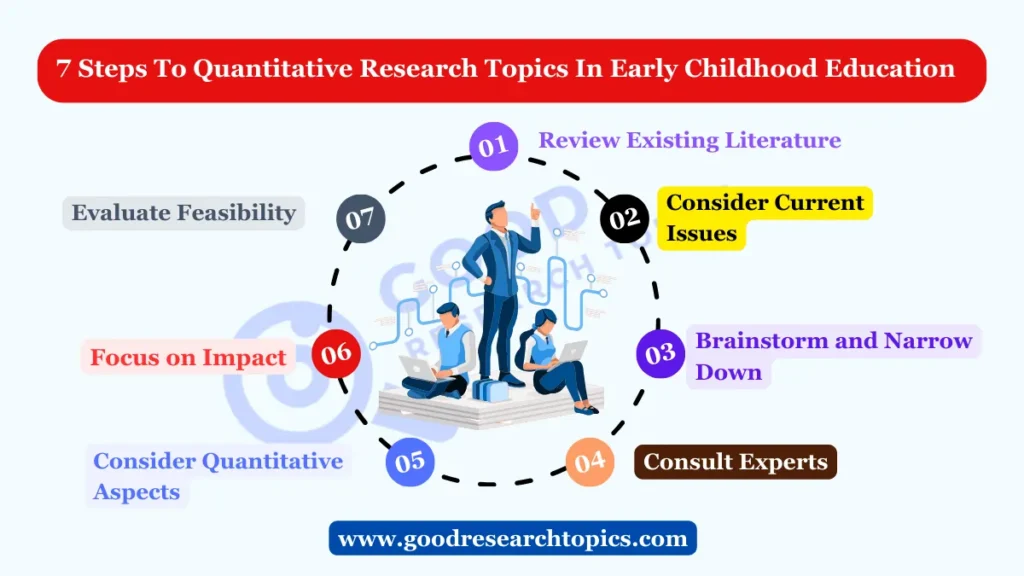Have you ever wondered what goes into making learning better for little kids? How do teachers decide what activities work best for them? Well, that’s where Quantitative Research Topics in Early Childhood Education step in!
For many years, teachers and researchers have been curious about finding the most effective ways to teach and engage young minds. Quantitative research in early childhood education involves using numbers and data to understand different aspects of teaching and learning. It’s like solving puzzles by collecting information and analyzing it to uncover valuable insights.
For example, counting how many children enjoy learning with colorful pictures versus how many prefer stories to learn new things. That’s quantitative research! It helps experts figure out which teaching methods work well and which might need some changes.
In this article, we’ll dive into more than 71 quantitative research topics in early childhood education. Each topic is like a doorway to understanding different parts of how kids learn and how teachers can make education more enjoyable and effective for them.
You May Also Know: Qualitative Research Topics for High School Students
What Is Quantitative Research In Child Development?
Quantitative research in child development involves the systematic collection and analysis of numerical data to understand various aspects of children’s growth, behavior, learning, and overall development. This method focuses on measuring and quantifying observable phenomena to draw statistical conclusions and identify patterns or relationships.
In essence, quantitative research in child development uses statistical tools, surveys, assessments, and experiments to gather data that can be objectively analyzed. It aims to provide precise and measurable insights into how children develop physically, cognitively, emotionally, and socially. By using numerical data, researchers can examine trends, correlations, and associations between different variables, such as environmental factors, parenting styles, educational interventions, and child outcomes.
Through quantitative research, scholars and professionals in child development seek to uncover empirical evidence and establish statistical relationships that help in making informed decisions about policies, interventions, and educational practices that can positively impact children’s well-being and growth.
How Can I Find Good Quantitative Research Topics In Early Childhood Education
Finding good quantitative research topics in early childhood education involves considering various aspects that are both relevant and impactful. Here’s a guide to help you discover such topics:

1. Review Existing Literature
Start by exploring academic journals, books, and articles focusing on early childhood education. Identify gaps, controversies, or areas that need further investigation. Look for recent studies or emerging trends in the field.
2. Consider Current Issues
Pay attention to ongoing discussions or challenges in early childhood education. Topics such as the impact of technology on learning, the effectiveness of different teaching methodologies, or the influence of socio-economic factors on child development can be potential areas for research.
3. Brainstorm and Narrow Down
Generate a list of potential topics based on your interests, questions, and curiosities. Brainstorm with peers, educators, or mentors to refine and narrow down the list.
4. Consult Experts
Engage with professors, researchers, or professionals in early childhood education. Discuss potential research areas or seek their guidance to identify topics that align with your interests and academic goals.
5. Consider Quantitative Aspects
Ensure the topics you consider are measurable and can be studied using quantitative methods. Look for areas where data collection through surveys, experiments, observations, or statistical analysis can be applied effectively.
6. Focus on Impact
Choose topics that have practical implications and can contribute to improving early childhood education practices. Topics addressing issues like the effectiveness of specific interventions, learning outcomes, or identifying factors influencing child development can be highly impactful.
7. Evaluate Feasibility
Assess the feasibility of conducting research on the selected topics. Consider factors such as accessibility to resources, time constraints, ethical considerations, and the availability of data.
List Of Interesting And Best Quantitative Research Topics In Early Childhood Education
Here are a variety of quantitative research topics in early childhood education across different fields:
Cognitive Development
- The impact of early STEM (Science, Technology, Engineering, Mathematics) exposure on cognitive skills in preschoolers.
- Quantifying the effects of storytelling on memory retention and cognitive development in young children.
- Examining the relationship between block play and spatial reasoning abilities in early childhood.
- Assessing the influence of parental involvement in educational games on problem-solving skills in toddlers.
- Investigating the effects of bilingual education on cognitive flexibility in preschoolers.
Language Development
- Quantitative analysis of the effects of music-based interventions on language acquisition in early childhood.
- Investigating the correlation between book reading frequency and language fluency in preschoolers.
- Assessing the impact of digital literacy programs on early language development in young children.
- Examining the effects of storytelling with puppets on narrative skills in early education.
- Quantifying the benefits of early sign language exposure on language proficiency in toddlers.
Social and Emotional Development
- Examining the effects of play-based learning on social skills development in early childhood.
- Assessing the impact of emotional regulation interventions on behavior in preschoolers.
- Quantifying the relationship between pretend play and emotional intelligence in young children.
- Investigating the effects of peer mentoring programs on social interactions in early education.
- Assessing the influence of parental modeling on empathy development in preschoolers.
Early Childhood Education Programs
- Quantitative analysis of the effects of Montessori education on holistic development in young children.
- Investigating the correlation between outdoor nature-based education and overall well-being in preschoolers.
- Assessing the impact of art therapy programs on creativity and expression in early childhood.
- Examining the effects of integrated technology in classrooms on learning outcomes in young children.
- Quantifying the benefits of inclusive education programs on social integration and development.
Parental Involvement and Education
- Investigating the correlation between parental involvement in extracurricular activities and academic success in early childhood.
- Assessing the impact of parental engagement in educational field trips on learning retention in young children.
- Examining the effects of parent-child joint reading on literacy development in preschoolers.
- Quantifying the benefits of involving parents in cooking and nutrition workshops for early childhood health.
- Investigating the influence of parental encouragement on the development of growth mindset in toddlers.
Curriculum and Teaching Methods
- Quantitative analysis of the effects of game-based learning on academic achievement in early childhood.
- Investigating the correlation between sensory play activities and cognitive development in young children.
- Assessing the impact of drama-based education on communication skills in preschoolers.
- Examining the effects of project-based learning on critical thinking abilities in early education.
- Quantifying the benefits of multicultural education on cultural awareness in toddlers.
Assessments and Measurements
- Investigating the reliability and validity of assessments for measuring executive functions in young children.
- Assessing the impact of early numeracy assessments on later mathematical abilities in early childhood.
- Quantifying the relationship between fine motor skills development and handwriting proficiency in preschoolers.
- Examining the effects of literacy screening tools on early identification of reading difficulties.
- Quantitative analysis of the correlation between gross motor skills and overall physical health in young children.
Health and Nutrition
- Investigating the effects of nutrition education on healthy eating habits in early childhood.
- Assessing the impact of physical fitness programs on attention and focus in preschoolers.
- Quantifying the relationship between sleep patterns and cognitive function in young children.
- Examining the effects of mindfulness practices on stress reduction and well-being in early education.
- Investigating the benefits of incorporating gardening activities on nutritional knowledge in toddlers.
Policy and Implementation
- Assessing the impact of government-funded early childhood education programs on learning outcomes.
- Investigating the correlation between teacher qualifications and the quality of early childhood education.
- Quantifying the effects of technology integration policies on learning outcomes in early education.
- Examining the influence of inclusive education policies on attitudes towards diversity in preschool settings.
- Assessing the impact of family-friendly workplace policies on parental involvement in early education.
Additional Quantitative Topics
- The effects of socio-economic status on access to quality early childhood education.
- Quantifying the benefits of gender-neutral education approaches on social development.
- Investigating the correlation between screen time exposure and attention span in young children.
- Assessing the impact of sleep routines and bedtime habits on overall well-being in toddlers.
- Quantifying the effects of parent-child playtime on bonding and emotional connection in early childhood.
Educational Technology
- Examining the effects of interactive learning apps on literacy and numeracy skills in preschoolers.
- Quantifying the benefits of virtual reality technology in early childhood education.
- Assessing the impact of gamification in educational software on learning engagement in toddlers.
- Investigating the correlation between screen-based learning and attention deficit issues in young children.
- Quantifying the effects of digital storytelling platforms on narrative skills development in early education.
Play-Based Learning
- The impact of structured play activities on cognitive development in early childhood.
- Quantitative analysis of the effects of outdoor play on physical and emotional health in toddlers.
- Investigating the benefits of cooperative play in developing social skills in young children.
- Assessing the correlation between open-ended play materials and creativity in early education.
- Quantifying the effects of guided imaginative play on language and communication skills in preschoolers.
Cultural and Diversity Education
- The impact of culturally responsive teaching on academic achievement in diverse early childhood classrooms.
- Investigating the correlation between exposure to diverse literature and cultural understanding in toddlers.
- Assessing the benefits of bilingual education on cognitive development in young children.
- Quantifying the effects of multicultural music education on cultural appreciation in early childhood.
- Examining the influence of inclusive classroom practices on empathy and acceptance in preschoolers.
Professional Development and Teaching Practices
- Investigating the correlation between teacher training programs and student academic success in early education.
- Assessing the impact of mentoring programs on novice teachers’ classroom effectiveness.
- Quantifying the benefits of ongoing professional development for early childhood educators.
- Examining the effects of teacher self-efficacy on student engagement and learning outcomes.
- The impact of reflective teaching practices on instructional quality in early childhood settings.
Physical Environment and Learning
- Investigating the effects of classroom design on attention and focus in preschoolers.
- Quantifying the benefits of natural light exposure in learning environments for early childhood development.
- Assessing the impact of sensory-rich classrooms on cognitive development in young children.
- Examining the effects of noise levels on learning retention and concentration in early education.
- The correlation between classroom temperature and student academic performance in early childhood.
Special Needs Education
- Investigating the impact of inclusive education on the social development of children with disabilities.
- Quantifying the effects of assistive technology on learning outcomes for special needs students.
- Assessing the benefits of individualized education plans (IEPs) on academic achievement in early childhood.
- Examining the correlation between early intervention programs and developmental progress in children with special needs.
- Quantifying the impact of sensory integration therapy on learning behaviors in children with sensory processing disorders.
Parental Involvement and Support Programs
- Investigating the correlation between parental stress levels and children’s academic performance in early education.
- Quantifying the effects of parent-child interactive reading sessions on literacy skills development.
- Assessing the impact of parenting workshops on positive discipline strategies in early childhood.
- Examining the benefits of parental support groups on emotional well-being in families with young children.
- Quantifying the relationship between family engagement in school activities and student achievement.
Teacher-Student Relationships
- Investigating the effects of teacher-student bonding on academic motivation in early childhood.
- Quantifying the benefits of positive teacher-student interactions on emotional development in young children.
- Assessing the impact of mentoring programs on fostering positive relationships between teachers and students.
- Examining the correlation between classroom communication patterns and student engagement in early education.
- Quantifying the effects of teacher encouragement on student self-esteem and confidence.
Assessment and Intervention Strategies
- Investigating the correlation between early behavioral assessments and later school success.
- Assessing the impact of early speech and language interventions on long-term communication skills.
- Quantifying the benefits of early childhood intervention programs for children at risk of academic difficulties.
- Examining the effects of play-based assessment tools on accurately measuring developmental milestones.
- The correlation between social-emotional assessments and behavioral interventions in early childhood.
Educational Policy and Reform
- Investigating the effects of education funding policies on access to quality early childhood programs.
- Quantifying the impact of early childhood education policies on narrowing the achievement gap.
- Assessing the benefits of universal pre-kindergarten programs on school readiness and success.
- Examining the correlation between education policy changes and teacher retention in early childhood.
- Quantifying the effects of school readiness initiatives on improving kindergarten transition outcomes.
Quantitative Research Topics In Early Childhood Education Pdf
Here are the Quantitative research topics in the early childhood education pdf.
Why Are Quantitative Research Topics In Early Childhood Education Beneficial?
Quantitative research topics in early childhood education offer numerous benefits due to their empirical and data-driven nature. Here are several reasons why these topics are beneficial:
- Measurable Insights: Quantitative research provides measurable and quantifiable data, allowing researchers to obtain precise insights into various aspects of early childhood education. This data-driven approach helps in understanding specific phenomena, trends, and patterns with statistical accuracy.
- Evidence-Based Practices: Research findings from quantitative studies contribute to evidence-based practices in early childhood education. Educators and policymakers can rely on empirical evidence to make informed decisions about curriculum development, teaching methodologies, interventions, and resource allocation.
- Identifying Effective Strategies: Quantitative research helps identify effective teaching strategies, interventions, and programs that positively impact children’s learning outcomes. It allows for the comparison of different methods to determine which approaches yield the best results.
- Understanding Child Development: Through quantitative analysis, researchers can explore various factors influencing child development, such as socio-economic status, parental involvement, educational environments, and their effects on cognitive, social, emotional, and physical development.
- Informing Policy and Interventions: Research findings from quantitative studies can influence educational policies and interventions aimed at improving early childhood education. Policymakers can utilize this data to implement changes that positively impact educational systems and support young learners.
Conclusion
In the world of quantitative research topics in early childhood education, scientists explore many things to understand how kids learn. They dig into how children’s minds develop, how they pick up language, and how they make friends. A significant area they focus on is thinking skills. They investigate how activities such as puzzles or math games impact kids’ thinking abilities. Language is another area of interest. Researchers study how children learn words and stories. They also examine emotions and behavior, aiming to uncover if activities like playing or engaging in fun tasks together can positively influence kids’ happiness and kindness.
Educational programs hold a crucial place in their studies. Scientists want to determine if special teaching methods, like using computers or conducting classes outdoors, enhance children’s learning. They also analyze the role of parental involvement. They seek to understand whether activities such as reading together or cooking at home contribute to better academic performance. Health and nutrition are key aspects too. Researchers examine whether exercise, healthy eating, and sufficient sleep positively affect children’s performance in the classroom.
They also delve into policies and school practices. They investigate teaching methods and learning environments in various schools. They explore the impact of new rules or increased funding on educational outcomes. All these studies are aimed at improving early childhood education, making schools better for young children, and supporting teachers in delivering even more effective lessons.



